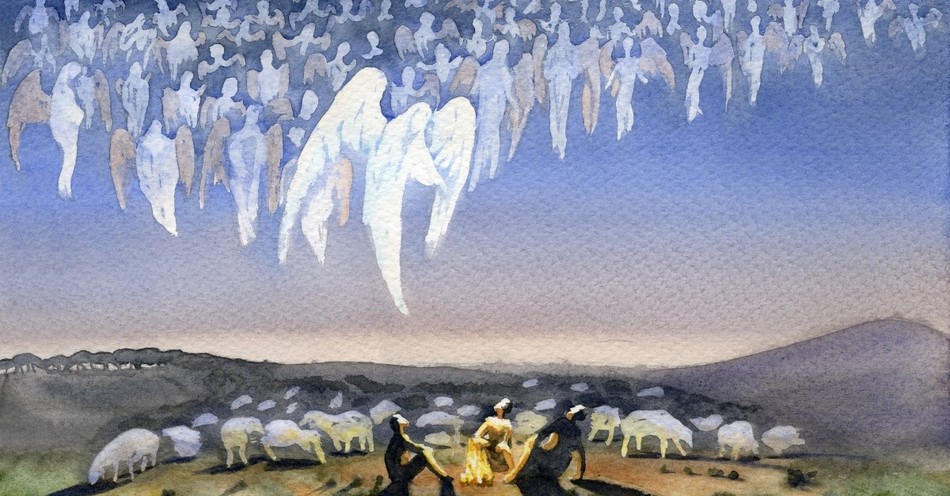If you were to walk down a city street and ask anyone, “What is an angel?” most people would have an answer. Even if the person is not religious, angels hold a mystery and are a visual representation of the spiritual part of our world. But what does the Bible tell us about angels? The Bible talks about several different angel types, but is there an angel hierarchy we know of?
Where Does the Bible Mention an Angel Hierarchy?
Within canonical Scripture, very little is told about the order or hierarchy of angels. Much of what we know has been assumed or is based on terms used in the scriptures in which angels are mentioned.
In Joshua 5:14, Joshua meets with a commander of the army of the Lord, who gives the instructions to walk around Jericho. An army is a term most understood as having order, ranks, and a hierarchy to establish order within a battle.
An angel army appears again in Revelations 12:7, when Michel leads “his angels.” This suggests that Michael has authority over the angles battling against the dragon in Revelations 12.
Knowing the character of God, being a god of order, not chaos, it stands to reason that as he gave man dominion over the creatures of the earth (Genesis 1:26). God would also establish a hierarchy among the created angels.
Who Are Some of the Leaders in the Angel Hierarchy?
In Daniel 10 and Jude 9, the angel Michael is introduced as an archangel, which in Greek means chief angel. The term archangel suggests that the angels have ranks or a hierarchy. But not much else is known about angels. We do know there are different types of angels—seraphim, cherubim, and the archangel Michael.
In an article on archangels, Author Hope Bolinger says, “A passage in Tobit 12:15-22 indicates seven archangels exist.”
In the 66 books of the Protestant Bible, angels only appear or are mentioned just over 100 times. Much of what is ‘known’ about angels is from apocryphal books of the Catholic Bible and some Jewish and Kabbalistic lore.
Crosswalk.com writer Sue Schlesman mentions that “in the fifth century, Christian philosopher Pseudo-Dionysius divided angels into 3 hierarchies with 9 orders, listing seraphim as the highest order and angels like Gabriel as the lowest.”
Thomas Aquinas followed a similar hierarchy in his Summa Theologica, which listed angels into three hierarchies, each further divided into three orders. The first hierarchy is that of the order of Seraphim, Cherubim, and Thrones. The second hierarchy contains the orders of Dominations, Virtues, and Powers, and the third hierarchy holds the order of Archangels, Angel, and Principalities. These were the same hierarchy that Pope Gregory the First accepted in the sixth century.
Is the Angel of the Lord Part of the Angel Hierarchy?
But where does the “Angel of the Lord” fit into the Angel Hierarchy?
Theologian Scot McKnight argues in The Hum of Angels that there are rare occasions when the “angel of the Lord” or “the angel” refers to God himself.
Baker’s Evangelical Dictionary says, “In many passages in the Old Testament, the angel of the Lord is identified with God, while in other instances a distinction is made between the Lord and the angel. In general, however, the terms “the angel of the Lord,” “the Lord,” and “God” are interchangeable.”
Theologians also refer to this as a theophany, a manifestation of God that is tangible to the human senses or a pre-incarnate appearance of Jesus himself.
The Angel of the Lord is mentioned many times in the Old Testament with Hagar (Genesis 16:7-14), Abraham (Genesis 22:11-18), Moses (Exodus 3:5), and others. (Judges 5:23, 2 Kings 19:35, Zechariah 1:12) Interestingly, in the New Testament, we do not find the term Angel of the Lord used. This is believed to be because the pre-incarnate Messiah has come to earth in Jesus Christ.
How Did Lucifer Fit into the Angel Hierarchy?
Some extrabiblical texts place Lucifer as one of the Archangels along with Michael and Gabriel. But much of what we know about Lucifer from Scripture comes from Ezekiel 28:11-19 and Isaiah 14. Even in these passages, there is a lack of clarity as to whether the verses refer to Lucifer or the Kings of Tyre and Babylon.
In his commentary on Ezekiel 28, Dr. Thomas L. Constable says this about the Ezekiel 28 and Isaiah 14 passages:
“If these two passages of Scripture do not describe the fall of Satan, we have no other information about that event. This bothers some Bible readers since we would like to know how Satan fell. However, there are many other questions that we Bible readers would like answers to, but God has not provided them either. We must be content to limit our understanding to what God has revealed, though, of course, we love to speculate about unrevealed matters—such as, for example, the details of what heaven will be like.”
If Ezekiel 28 refers to Lucifer, it labels him as a guardian cherub (Ezekiel 28:16) rather than an archangel.
Ron Rhodes of Reasoning from the Scriptures Ministry suggests, “Lucifer became so impressed with his beauty, intelligence, power, and position that he began to desire for himself the honor and glory that belonged to God alone. The sin that corrupted Lucifer was self-generated pride.”
Lucifer was cast out of heaven for his pride and sin, and any authority he did have was removed. In Luke 10:18, Jesus says, “I saw Satan fall like lightning from heaven,” to describe the judgment of Lucifer.
What Can the Angel Hierarchy Teach Us about God’s Character?
“For since the creation of the world God’s invisible qualities—his eternal power and divine nature—have been clearly seen, being understood from what has been made, so that people are without excuse.” (Romans 1:20). This verse is often used to talk about how God can reveal himself in the earthly creations he made, but I feel the same is true for the heavenly creation also.
The word angel comes from the Greek translation of the Hebrew word malach, which means messenger. Just the word itself tells us much about God and his character. He desires to have a relationship with us, to commune with us as he did with Adam and Eve before the fall (Genesis 3:8). Every action since the fall has been with great intention to restore the relationship between God and humankind. He even sent his heavenly creations to participate in this rescue mission.
Throughout Scripture, angels in all their forms and authority have come to announce what God is doing, to protect those he calls his own, and in some cases, to enact the judgment of the Lord. Angels were also sent to care for Jesus in the Garden of Gethsemane (Luke 22:43).
God is the god of order and purpose, and both his earthly and heavenly creations show us that we cannot fully comprehend the great glory of God.
Further Reading:
What Are All the Names of Angels in the Bible?
Are There Angels Among Us Today? What Is Their Purpose?
What Are Angel Numbers and Are They Biblical?
How Do We Know That Angels Are Real?
Photo Credit: © Getty Images/ OlgaPtashko

You can find out more about Valerie, her books, and her blog at www.valeriefentress.com.
This article is part of our Bible resource for understanding the significance and meaning of biblical phrases and ideas. Here are our most popular Bible articles to grow in your knowledge of God's Word:
Promises of God in the Bible
Is "This Too Shall Pass" in the Bible?
What Was the Ark of the Covenant?
Top 10 Bible Stories for Kids
“Iron Sharpens Iron” in Proverbs 27:17
"Fearfully and Wonderfully Made" in Psalm 139
“Be Still and Know That I am God” in Psalm 46:10
"No Weapon Formed Against Me Shall Prosper" - Isaiah 54:17




